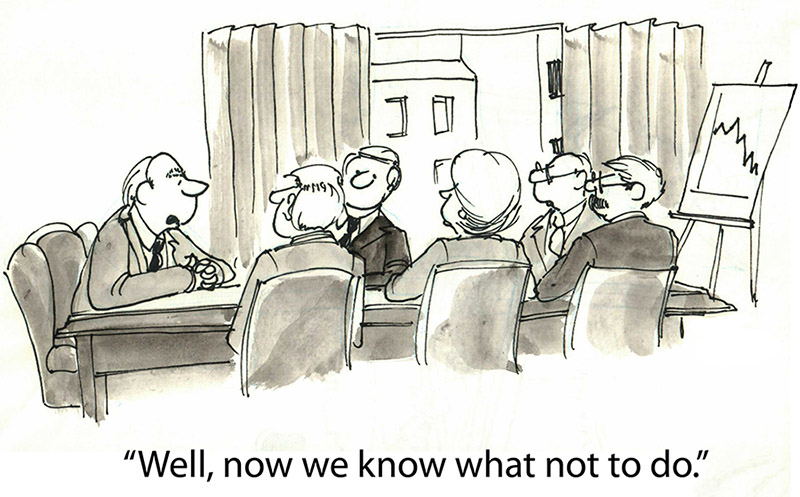
Customer feedback and online reviews are incredibly important, and with that importance many businesses can become short sighted on the best ways to acquire and manage them.
I want to share some of the things I see consistently wrong with how an organization requests customer feedback and online reviews. Companies that make these choices erode the authenticity, honesty, and access that make feedback and reviews so powerful. It’s what you can learn from them, it’s not what you can show/brag/market/hide behind with them.
1. The Force Play – Just Give A 5-Star Review
I recently bought a new refrigerator from Home Depot. Everything about my experience in the store and setting up delivery was great and within days the delivery team was at my house to bring in the new refrigerator and remove the old one.
When we were given the paperwork that came along with the delivery, this immediately caught my eye.
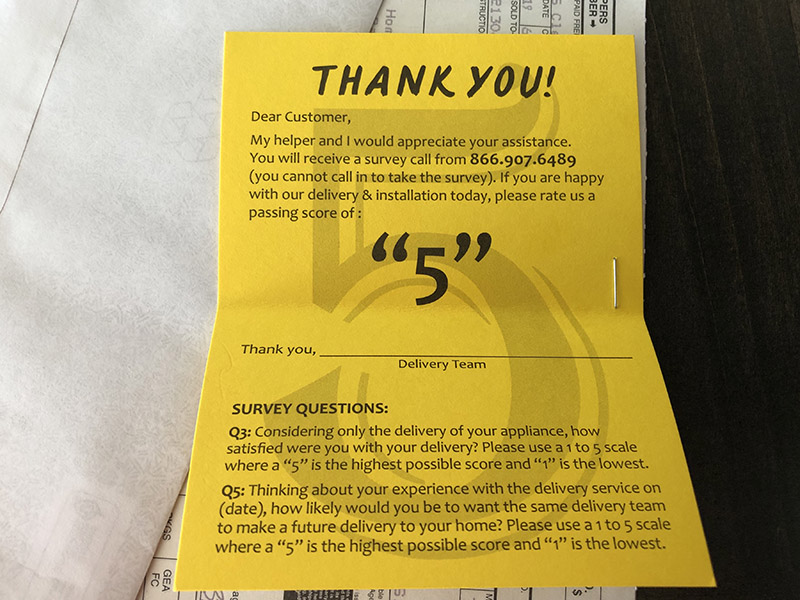
Now this isn’t the first time I have been asked to review a business this way. It’s not a “How did we do?”, it’s a “Give us 5 stars” command. Something I like to call, The Force Play.
While this one isn’t as strong armed as some I have come across, it is meant to guide you to one thing… rating them a 5. It’s not asking for open and honest feedback, it’s driving home that a 5 is the only score to give.
A few years back a retail giant had this same thing at my local store location. At the register was a sign telling you to rate the store a 10 on their survey so they could win an award and get a customer service bonus. Again, not an “evaluate us honestly”, but a “just mark us a 10 no matter what”, so we can get our bonus.
What does a business learn from this? Nothing. What’s even worse is if they then use these ratings in marketing or on their website to mislead the next customer.
2. The Gauntlet
Bottom line… it should be easy for your customer to talk to you. Anytime. From any channel. When your customer feedback process involves creating too much work for your consumer, you are making them jump though unnecessary hoops just to help your business learn. Big mistake.
In the past, we have cited a couple of feedback processes that required too much of the customer. Both Delta Airlines and Arby’s feedback loops fall into a “morass” of customer feedback with poor access, too many questions, and too many data points needed to complete the process. These companies seem to want data far more than they actually want to hear their customer.
I was reminded of this in the last couple of weeks when I went to get my car detailed after another brutal Minnesota winter. Instead of a quick and easy form to share my thoughts or a rating, I first needed to provide a laundry list of data points from my receipt. I opted for not even trying.
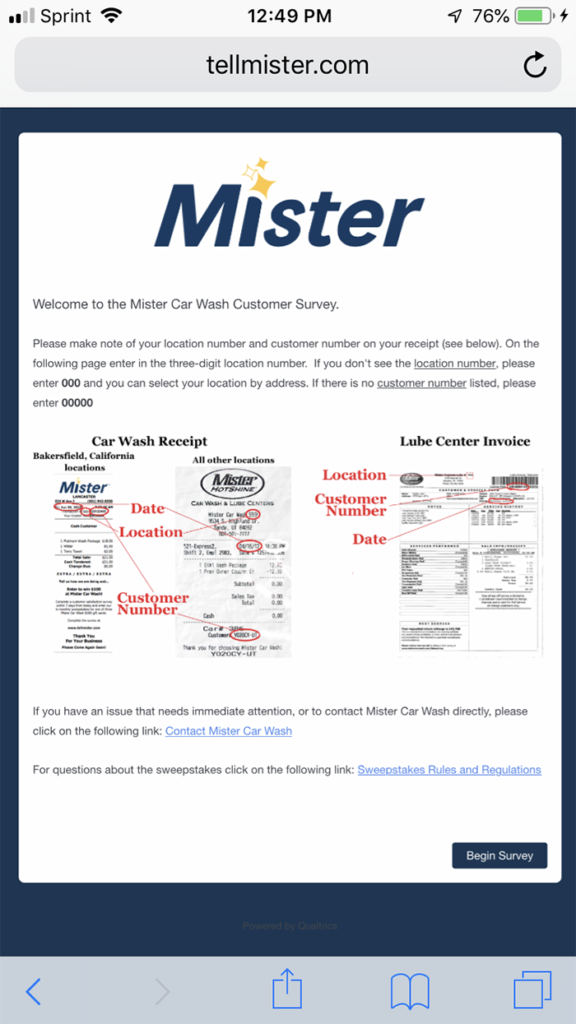
I can understand that having this information for the business is helpful to give detailed insight into the experience, but at what cost? Less customers will talk to you and it won’t outweigh the positives of giving your customer a voice… more data for you to learn from AND having your feedback process actually be a positive brand touch.
Creating a feedback gauntlet for your customer ensures that only the most happy or most pissed customers will make it through. You should be focused on activating and empowering the 90% of your customer base in the middle so you can reap the rewards of their feedback. Do this by making reviews and feedback easy. Make the process accessible so they can easily choose to do it from your website, from your request, from their phone, etc.
3. Review Gating
In short, review gating is the tactic of allowing happy customers to write online reviews and trying to prevent the unhappy customers from doing so. You deny “equal opportunity” by asking the customer if they are happy using a star rating or thumbs up/down rating and then only putting a review request in front of your 4 star or 5 star customers and not the 1 star or 2 star ones.
Both Google and Trip Advisor state in their Terms of Service that review gating is not allowed if you are going to request reviews. But that doesn’t stop many reputation solutions from still using it (GatherUp does not).
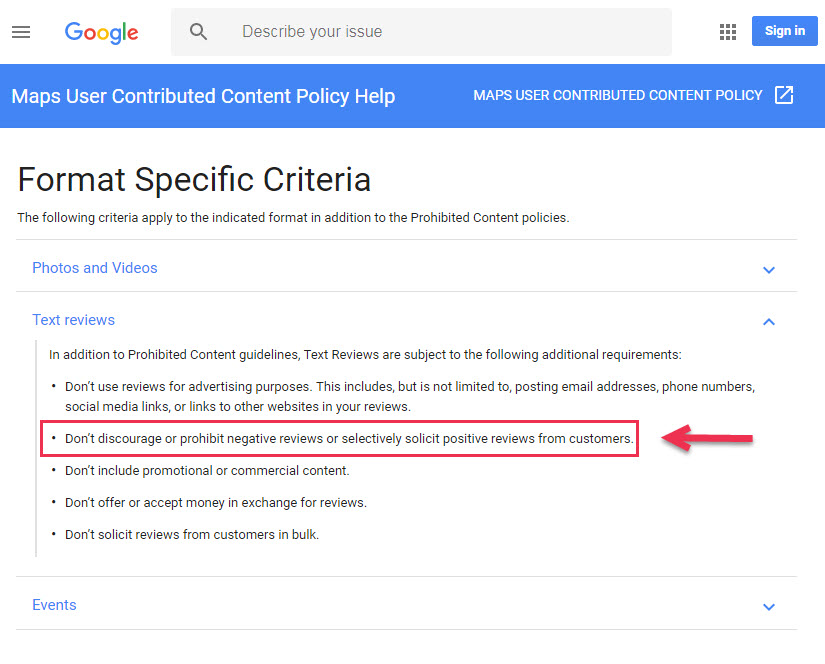
It’s easy to understand why a business would prefer to use this gating tactic, it makes them feel a layer of protection against unhappy customers. This perspective isn’t completely accurate though and you should think about both the consequences and the other losses in doing this.
- Putting your reviews in jeopardy of being removed by Google is not worth it. Reviews are hard to earn and acquire, why put them at risk?
- When you ask for feedback and reviews in one process and allow the customer to talk to you first in a 1st-party review, they will likely have gotten any issues or criticism off their chest. You will have reduced the need to publicly share their frustration in a bad review.
- When done right, you can still ask if the customer is happy or unhappy. Then use that sentiment to personalize the content in your request process to reduce the frustration. A low rating when you ask can then serve up a step with an apology, the ability to give more information to the business privately, and STILL show the review links and be in compliance.
- We see repeatedly that a consumer will be more critical directly to the business with a 1st-party review/feedback, but still write a 4 star review on Google. Where their direct feedback is specific to an employee or visit, the positive review is written on the overall brand and sum of multiple experiences. It’s also one more reason that 1st-party reviews are so amazing, but still under-valued.
In considering all of the above, you can see that review gating isn’t a needed protection. If you are getting bad online reviews, you are missing the starting point of great service and products that you will continue to miss until corrected… not from having a review gating trick when you ask.
4. Review Incentives
Customers love contests and they love offers. And they like writing reviews so much more when there is a chance to win something in the air. So what’s the harm in offering a coupon for $5 off your next purchase or a chance to enter a contest? A lot.
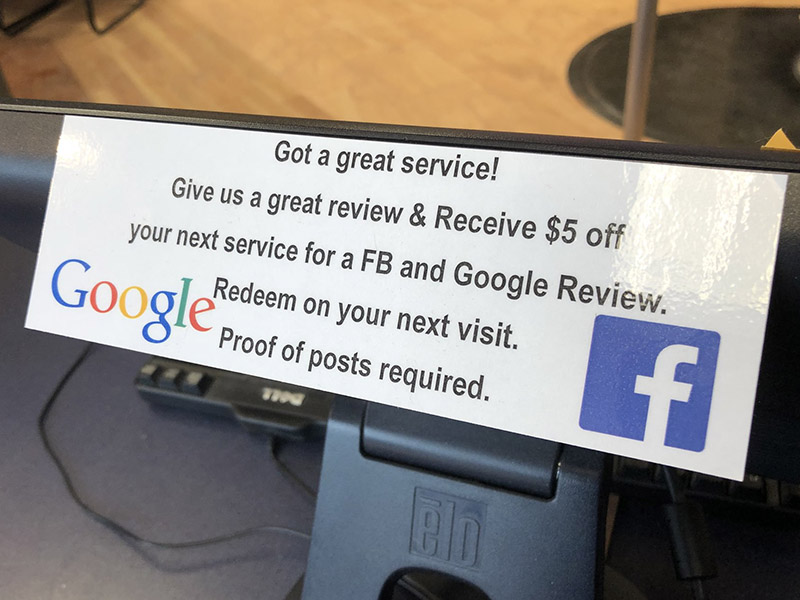
Google, if you are reported, will take down your reviews. Yelp will put up a large badge of shame on your listing. The government might fine you. Incentivizing reviews is against the law and FTC regulations as well as against the terms of service for most major review sites.
And if that’s not bad enough you could very well lose customer goodwill. Forever.

Many business owners want a quick win in the review space and incentives might provide that, but the risks are high. Reviews are a long term investment and are best crafted like a great bourbon, slowly, over time.
Make Reviews Easy, Authentic, and Valuable
By avoiding the 4 mistakes above, you can get an incredible amount of real, valuable data from your customer feedback and online review requests.
With the ecosystem of reviews approaching an authenticity crisis, I’d advise any business or marketer to think about not just about what I’ve outlined here, but their overall contribution to this issue of review integrity. Your brand will lose out as will the consumer if you don’t put the customer first.
Comments are closed.